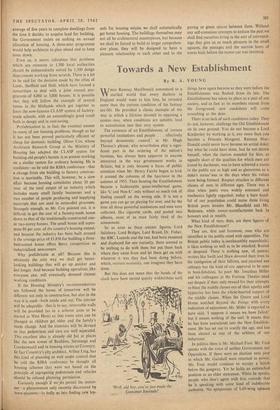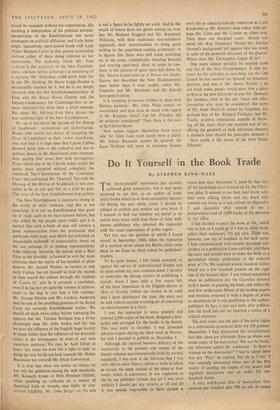Towards a New Establishment
By B. A. YOUNG WHEN Ramsay MacDonald announced to a startled world that every duchess in England would want to kiss him, he revealed more than the curious condition of his fantasy sex-life. He provided a classic example of the way in which a lifetime devoted to opposing a system may, when conditions are suitable, lead to assimilation into that very system.
The existence of an Establishment, of 'certain powerful institutions and people . . . effectively beyond democratic control,' in Mr. Hugh Thomas's phrase, who nevertheless play a signi- ficant part in the ordering of the nation's business, has always been apparent to anyone interested in the way government works in Britain; but it only became a focus of public attention when Mr. Henry Fairlie began to kick it around the columns of the Spectator in the autumn of 1955. Then hunting the Establishment became a fashionable quasi-intellectual game, like 'U and Non-U' only without so much risk of finding oneself on the wrong side. It is not a game you can go on playing for ever, and by the time all those powerful institutions and men were collected, like cigarette, cards, and pasted into albums, most of us were fairly tired of the amusement.
So as soon as these sinister figures, Lord Salisbury, Lord Bridges, Lord Brand, Dr. Fisher, the BBC, Lazards and the rest, had been mounted and displayed for our curiosity, there seemed to be nothing to do with them but put, them back where they came from and let them get on with whatever it was they had been doing before, which, mutatis mutandis, one imagines they have done.
But this does not mean that the hands of the clock have been turned quietly widdershins until
'Well, old boy, you've just made the
4(i Goncourt Journals!' things have again become as they were before the Establishment was flushed from its lair. The Establishment has taken its place as a part of our society, and as fast as its members retreat from the foreground, new candidates will come scratching at the door.
There is no lack of such candidates today. They do not, however, challenge the Old Establishment on its own ground. You do not become a Lord Kindersley by working at it, any more than you become a Princess Margaret. Ramsay Mac- Donald could never have become an actual duke; but what he could have done, had he not shown himself, when the clarion sounded for him, so signally short of the qualities for which men are kissed by duchesses, was to have achieved a status in the public eye as high and as glamorous as a duke's status'was in the days when his values were being formed. Respect attaches to different classes of men in different ages. There was a time when poets were widely esteemed and mechanics lightly regarded; today a bare hand- ful of our population could name three living British poets besides Mr. Masefield and Mr. Betjemen, while motor-manufacturers bask in honours and in wealth.
What kind of men, then, are these figures of the New Establishment?
They are, first and foremost, men who are identified in the public mind with opposition. The British public today is inexhaustibly masochistic; it likes nothing so well as to be attacked, flouted or despised. There is nothing new, of course; writers like Swift and Shaw devoted their lives to the castigation of their fellows, and received not obloquy but the kind of coy approval to be seen in boot-fetishists. So poor Mr. Jonathan Miller and his colleagues at the Fortune Theatre need not despair if their only reward for their attempts to blast the middle classes out of their apathy and hypocrisy has been the whole-hearted support of the middle classes. When the Queen and Lord Home watched Beyond the Fringe with every indication of enjoyment, Mr. Miller is reported to have said, 'I suppose it means we have failed;' but it means nothing of the sort. It means that he has been assimilated into the New Establish- ment. He has set out to scarify the age, and has been elected as one of the arbiters of our behaviour.
In politics there is Mr. Michael Foot. Mr. Foot speaks with the voice of neither. Government nor Opposition. If there were an election next year in which Mr. Gaitskell were returned to power, Mr. Foot would continue to occupy a bench below the gangway. Yet he holds an entrenched position as an 'elder statesman. When he speaks, people who don't agree with him concede that he is speaking with some kind of indefinable authority. No symposium of Left-wing opinion would be complete without his contribution. His standing is independent of his political attitude; membership of the Establishment was never contingent on political affiliation, and Lady Astor might, figuratively, have joined hands with Lady Violet Bonham Carter in that greater association without either of them doing violence to her convictions. The authority which Mr. Foot radiates is the authority of the New Establish- ment, and how he has achieved it is something of a mystery. Mr Silverman could never hope for it, nor Mr. Driberg; Sir Harry Legge-Bourke is occasionally touched by it, but he is too deeply involved with the Oki Establishmentarianism of Eton and the Royal Horse Guards and the Deputy-Lieutenancy for Cambridgeshire to re- main illumined for more than a brief moment. But about Mr. Michael Foot there gleams the true authentic light of the New Establishment.
We see it too about the person of the Bishop of Southwark : contentious yet authoritarian. People who would not dream of accepting the Dean of Canterbury as their slodel churchman, who feel that it is high time that Canon Collins devoted more lime to his cathedral and less to politics, descry in Dr. Stockwood some transcen- dent quality that arms him with prerogative. From whom else in the Church today would the Public have accepted without complaint the medieval Star-Chamberism of the Consistory Court that unfrocked Dr. Thomas? Yet with the blessing of the Bishop of Southwark it was con- ceded to be as just and fair as a trial by jury. The voice of the New Establishment had, spoken.
The New Establishment is peculiarly strong in the world of show business, and this is not surprising. It is not an Establishment that grew up of itself, such as we have known before, but one willed by the people upon itself; and it is natural that such a body of men will contain a good representation from the profession that Publicises itself most, and which has achieved an unassailable hallmark of respectability based on the vast earnings of its leading representatives. John Osborne, lecturing the nation with a. Blue Chip on his shoulder, is listened to with far more attention than the merits of his handful of plays deserve. Mr. Arnold Wesker, as earnest as any early Fabian, has set himself to lead the masses in their search for culture through the medium of 'Centre 42,' and he is certainly a candidate, even if he has not yet quite the volume of achieve- ment in the bag to rate him a full member. Mr. George Devine and Mr. Lindsay Anderson and the rest of, the presiding geniuses of the Royal Court are certainly Establishment timber. We should all think twice today before venturing the opinion that Mr. Terence Rattigan was a better playwright than Mr. John Arden, and for this we have the influence of the English Stage Society' to thank rather than the influence of the dramatic critics in the newspapers, or even of our own uncertain opinions. We may be Aunt Ednas at heart; but when we look for a light to light us along the way we do not look towards Mr. Binkie Beaumont but towards Mr. Oscar Lewenstein.
It is true that there are critics on whom we can rely for guidance among the new standards. Mr. Kenneth Tynan or Miss Penelope Gilliatt, when speaking ex cathedra on a matter of theatrical faith or morals, may fairly be con- sidered infallible. Mr. John Berger on the arts is no-f a figure to be lightly set aside. And in the world of letters there are giants among us, men like Mr. Richard Hoggart and Mr. Raymond Williams, with their studiously non-mandarin approach, their determination to bring good writing to the paperback-reading proletariat It is figures like these who will come crowding on to the scene, symbolically wheeling bicycles and wearing open-neck shirts in order to con- form to the pattern of great men laid down by Mr. Martin Green (who in A Mirror for Anglo- Saxons has described the New Establishment man better than I ever could), when Mr. Connolly and Mr. Mortimer and Sir Harold have gone from us.
It is tempting to browse further in these lush literary pastures: Mr. John Wain cannot be overlooked, and how does he stand with regard to Mr. Kingsley Amis? Can Mr. Priestley still be seriously considered? Then there is the case of Sir Charles Snow.
New names suggest themselves from every side. Sir Allen Lane must surely have a claim. Mr. Sidney Bernstein cannot be ignored Sir Isaac Wolfson will serve to represent finance every bit as characteristically tomorrow as Lord Kindersley or Mr. Keswick does today, with per- haps Mr. Clore and Mr. Cotton on either arm. Then there are marginal cases: should one admit Mr. Roy Thomson? Would Mr. Jocelyn Stevens's background tell against him too much in spite of the powerful advocacy of the Queen? Where does Mr. Christopher Logue fit in?
One name cannot possibly be omitted from any list of the New Establishment, if only be- cause by his activities in searching out the Old Guard he has secured for himself an honorary position, and that is Mr. Henry Fairlie. I do not think many people would deny him a place as firm in the new hierarchy as ever Mr. Dawson. for instance,, held in the old. There are other journalists who must be considered; the name of Mr. Rend MacColl cannot be forgotten, nor perhaps that of Mr. Richard Findlater; but Mr. Fairlie, positive, omniscient, capable of throw- ing off the Daily Mail one moment and of sac- rificing the goodwill of both television channels a moment later should his principles demand it —here surely is the doyen of the New Estab- lishment.



































 Previous page
Previous page